Share your love
Install and Configure Zabbix on AlmaLinux 9

This guide intends to teach you How To Install and Configure Zabbix on AlmaLinux 9.
Zabbix is an open-source monitoring software tool for diverse IT components, including networks, servers, virtual machines (VMs), and cloud services. Zabbix provides monitoring metrics, such as network utilization, CPU load, and disk space consumption.
The software monitors operations on Linux, Hewlett Packard Unix (HP-UX), Mac OS X, Solaris, and other operating systems (OSes); however, Windows monitoring is only possible through agents.
Steps To Install and Configure Zabbix on AlmaLinux 9
To complete this guide, you must log in to your server as a non-root user with sudo privileges and set up a basic firewall. To do this, you can follow our guide on Initial Server Setup with AlmaLinux 9.
Also, you need to have the LAMP stack installed on your server. To do this, you can check our guide on How To Install LAMP Stack on AlmaLinux 9.
Download and Install Zabbix LTS on AlmaLinux 9
At this point, you need to visit the Zabbix Downloads Page and check the latest LTS version.
Then, you need to use the following commands to add the Zabbix repository on AlmaLinux 9:
# sudo rpm -Uvh https://repo.zabbix.com/zabbix/6.0/rhel/9/x86_64/zabbix-release-6.0-4.el9.noarch.rpm # sudo dnf clean all
Next, you can use the following command to install the Zabbix on your server:
sudo dnf install zabbix-server-mysql zabbix-web-mysql zabbix-apache-conf zabbix-sql-scripts zabbix-selinux-policy zabbix-agent -y
When your installation is completed, you need to create a Zabbix database and user.
Create Zabbix Database and User on AlmaLinux 9
Log in to your MariaDB console with the following command:
sudo mysql -u root -p
Next, from your MariaDB console run the following command to create a user, here we named it orca, you can choose your desired name. Remember to choose a strong password for your user.
MariaDB [(none)]> CREATE USER zabbixuser@localhost IDENTIFIED BY 'password';
Create the database with the command below:
MariaDB [(none)]> CREATE DATABASE zabbixdb character set utf8mb4 collate utf8mb4_bin;Now grant all the privileges to the Zabbix database user:
MariaDB [(none)]> GRANT ALL PRIVILEGES ON zabbixdb.* TO zabbixuser@localhost;
Flush the privileges and exit from your MariaDB console with the command below:
MariaDB [(none)]> FLUSH PRIVILEGES; MariaDB [(none)]> EXIT;
Import Database Schema
Here you need to import the database schema with the following command:
# sudo zcat /usr/share/zabbix-sql-scripts/mysql/server.sql.gz | mysql --default-character-set=utf8mb4 -u zabbixuser -p zabbixdb
You will be asked to enter your Zabbix user password.
Change Database Settings on Zabbix Configuration File
Now you need to edit the Zabbix configuration file on AlmaLinux 9.
Open the file with your favorite text editor, here we use vi:
sudo vi /etc/zabbix/zabbix_server.conf
Find the line below and change them to your database settings:
DBHost=localhost DBName=zabbixdb DBUser=zabbixuser DBPassword=password
You need to uncomment the DBHost and DBPassword lines by removing the “#” from the beginning of the lines.
When you are done, save and close the file.
Configure PHP-FPM on AlmaLinux 9
At this point, you need to specify the timezone setting in the Zabbix configuration on AlmaLinux 9. To do this, run the command below:
sudo vi /etc/php-fpm.d/zabbix.conf
Find the line below and uncomment it by removing the “;” from the begging of the line and adding your timezone:
php_value[date.timezone] = America/New_York
When you are done, save and close the file.
Restart all the services to apply the changes:
sudo systemctl restart zabbix-server zabbix-agent httpd php-fpm
To enable the services to start on boot, run the following command:
sudo systemctl enable zabbix-server zabbix-agent php-fpm
Configure SELinux and Firewall on AlmaLinux 9
At this point, you need to set SELinux to be allowed in order to access the Zabbix frontend on AlmaLinux 9. To do this, run the following command:
# sudo setenforce 0 # sudo sed -i 's/SELINUX=enforcing/SELINUX=permissive/g' /etc/selinux/config
Then, you need to allow traffic on ports 10050 and 10051 through the AlmaLinux firewall with the command below:
# sudo firewall-cmd --add-service=http --permanent
# sudo firewall-cmd --add-port={10051,10050}/tcp --permanentReload the firewall to apply the changes:
sudo firewall-cmd --reload
Access Zabbix Dashboard
Here you access the Zabbix web interface on AlmaLinux 9 by typing your server’s IP address in your web browser followed by /Zabbix:
http://server-ip/zabbixYou will see the Zabbix welcome page just click on the next step.
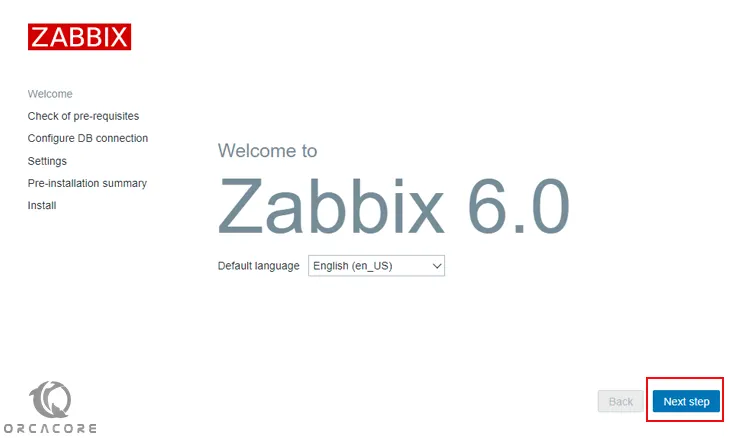
In the next window, you will see the check for the prerequisites. Make sure all the required PHP extensions are installed then click on the Next step button.
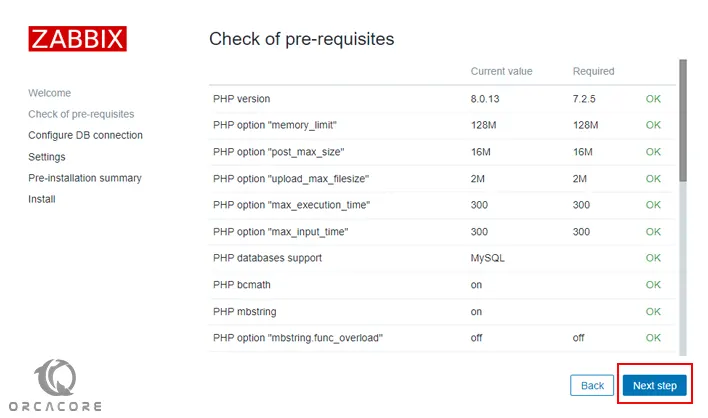
Then, you will see the configure DB connection page. Set your database details and click on the next step.
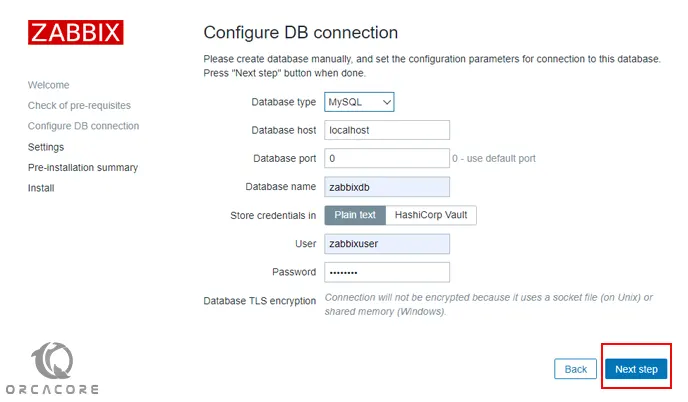
Next, you need to choose the server name and default theme and click the Next step.
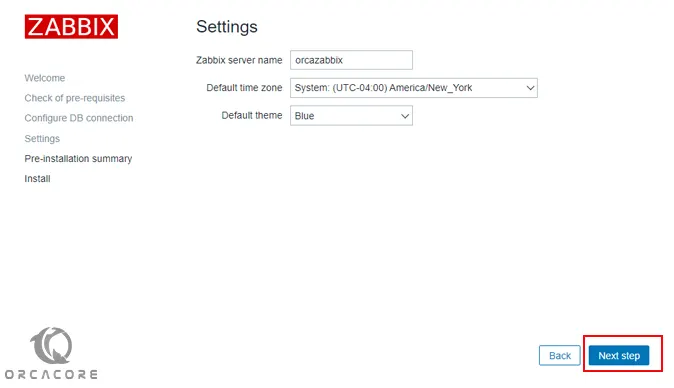
Here you need to check the pre-installation summary and click Next step.
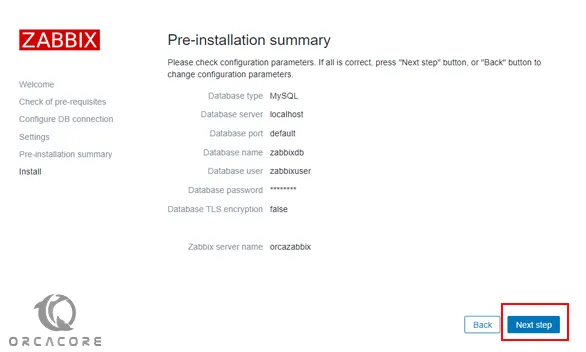
Next, you need to click on the finish button to complete your Zabbix 6.0 installation.
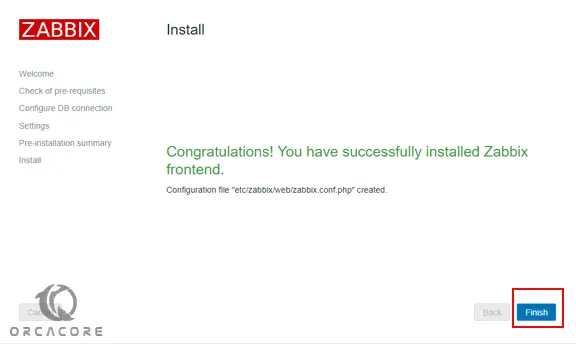
Now you will get into the Zabbix login screen. Enter the Admin as the username and zabbix as the password and click on the sign-in button.
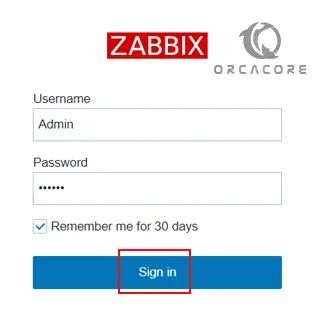
You will see your Zabbix dashboard.
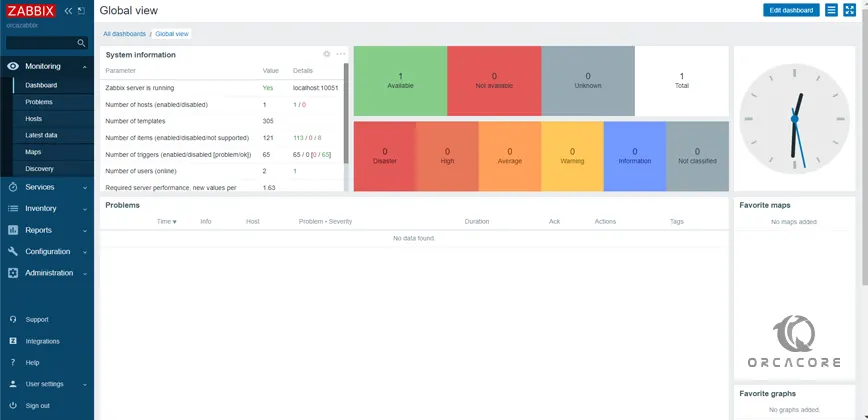
From there you can monitor things such as:
- Network Monitoring
- Server Monitoring
- Cloud Monitoring
- Services Monitoring
- KPI/SLA monitoring
Conclusion
At this point, you have learned to Install and Configure Zabbix LTS on AlmaLinux 9.
Hope you enjoy it.



